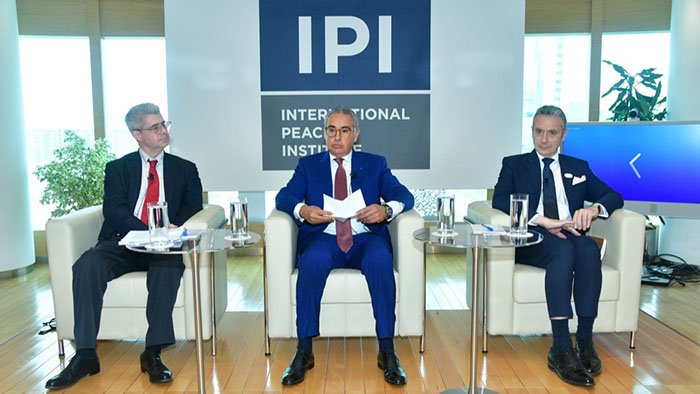
Professor Frederic Charillon, IPI MENA Senior Director Nejib Friji, and French Ambassador Jerome Cauchard
Key players from the diplomatic corps, governments, academics, and private sector convened at IPI MENA to call on the multilateral system and regional players to counteract wars of influence through preventive diplomacy.
IPI MENA hosted Prof. Frédéric Charillon, Professor of Political Science at the Université Paris Cite and former Director of the Institute of Strategic Research Ecole Militaire at the French Ministry of Defence for a conference on March 1st under the theme “The Wars of Influence: A New Challenge to the World’s Order” to debate the ways in which influence can mobilize increasing resources from states and modify the balance of power.
Opening the conference, IPI MENA Senior Director Nejib Friji questioned how the multilateral system, mandated to preserve peace and promote the peaceful settlement of conflicts and differences, could play a key role in preventing wars of influence.
Pointing to the role of think tanks and institutions in the context of twenty-first-century challenges, he stressed, “think tanks addressing peace and political, international affairs should work alongside the multilateral system and act as preventive tools to wars of influence.”
Professor Charillon stressed the importance of understanding influence as a set of processes of building obedience and consent that do not rely on force, but lean on capital, be it social or monetary, instead.
“It is not national branding or propaganda, it is about making people change their behavior and opinions,” he underlined, and pointed to the three main models of influence practiced globally: 1) the liberal democratic model which uses attraction to sway public opinion, such as via the concept of the “American Dream;” 2) the “sharp-power” model that uses concepts of fake news to sow doubt and discord in foreign societies; and 3) the model of community-network systems which focuses on creating an internal, devoutly-loyal base for the state.
Emphasizing possible tools of prevention, Professor Charillon noted the critical importance of education. “Young people need to be made aware, we need to educate populations to build critical minds that can identify instances of fake news,” he stated.
“Think tanks are also important in this regard,” he said. “They have several functions; they inform and bring people together to engage in dialogue which can diffuse and prevent escalations, and they can also generate new ideas.”
In response to a question posed by Mr. Friji on whether former colonizing powers have been helped by their former colonies in their wars of influence, Professor Charillon noted French foreign policy in Africa and the challenges it faces. “Former colonizing powers are outsiders now because the rules of the game have changed. It is not a chessboard game anymore but a web of many networks that is fluid with instant changes.”
He underlined that the end of the Cold War brought new rules to the international arena, resulting in nations turning to alternative methods to influence without using force. “The advent of technology contributed to this, and the reverse can also be said, technology must be used as a tool to prevent negative wars of influence.”
In line with this, French Ambassador to Bahrain Jerome Cauchard, also noted the ways in which sports are sometimes used as a political tool and oftentimes to generate a positive image for the nation, and therefore must also be a field in which preventive diplomacy should play a positive role.
The conference was concluded with an open-floor debate, featuring interventions by the diplomatic corps, private sector, business representatives, journalists and screenwriters.







